- Home
- Amy Harmon
The Law of Moses Page 4
The Law of Moses Read online
Page 4
He went to the rodeo with his grandmother. His grandma nodded helpfully. He came to see me ride. Mrs. Wright nodded again.
He did? The thought made me squirm and feel all warm inside. He continued in a quiet tone, giving the barest of details.
He was parked near the animal pens, standing next to his Jeep, trying to decide whether to go to the carnival for a couple corndogs and a caramel apple or to just head home. Someone had bumped into him from behind. He didn’t see who it was. A cowboy, he thought. Not especially helpful, I thought. But I couldn’t add anything to that description either. He thought he heard someone call out, scream even. And he found me. He untied me, he brought me home. The end.
Then Moses stared at the sheriff and repeated the same answers when Sheriff Dawson pressed him a little harder. Sheriff Dawson asked why he was parked by the pens instead of in the parking lot.
Moses answered that he didn’t want to walk.
The sheriff wanted to know why he couldn’t give a more detailed description of the man he’d seen running away, the man who’d run right into him?
Moses said his back was turned, and it was dark.
The sheriff seemed uneasy and suspicious, but I wasn’t. Moses wasn’t the one who had tied me up. He was the one who freed me. And that’s the only part I cared about.
Then it was my turn. I told my story too, my small audience hanging on every word. I told Sheriff Dawson that I thought it might be Terrence Anderson who had been pulling a prank, which was highly uncomfortable, considering Sheriff Dawson was Terrence’s uncle. But to his credit, the sheriff didn’t bat an eye or argue with me, and he promised to look into it. The sheriff took down everything I said and even took some pictures of the rope burns on my wrists and the scrapes on my face.
“What’s this? Is that something we need to document?” The sheriff pointed to the place Sackett’s hoof had connected with my forehead. It was three weeks old and mostly healed, but having my head ground into the dirt and gravel had irritated the scar, and it was now red and raw looking.
“Sackett got excited,” I said, shrugging, not wanting to rehash the incident. I knew the sheriff knew who Sackett was.
The sheriff grinned a little and pointed to a knot on his own forehead. “I wonder if Tonga was excited about the same thing. She got me good, damn horse. You can never get too comfortable around animals. Just when you think you’ve got ‘em figured out, they’ll do something completely unexpected.”
“Yeah. People are like that too.” I said, without thought.
And it was true. Tonight, more than ever. I felt the fear flood my mouth immediately and wondered how in the world I would be able to sleep tonight . . . or ever again. The sheriff nodded sympathetically and stood to go, but he reached out and patted my shoulder.
“I’m sorry, Georgia. I am. Whether it was a prank or something a lot scarier, I’m just grateful you’re okay. We’ll follow up with Terrence Anderson and Haylee Blevins and see if they know anything about it. We’ve got your statement and the pictures too. And of course, Mr. Wright’s statement as well.” The sheriff looked at Moses nervously, and I almost rolled my eyes. Everyone was afraid of Moses. I was pretty sure if I hadn’t been absolutely adamant it wasn’t Moses who tied me up before he untied me, he would be the number one suspect. He just looked wicked.
The sheriff stepped toward the kitchen door.
“I’m glad it’s the last night of the stampede. People get a little crazy. Hopefully, life will settle down a little around town and we’ll figure out what happened. We’ll be in touch.”
With that, Sheriff Dawson let himself out into the early morning darkness and we all sat, staring at the table, deep in our own thoughts, too tired to move just yet.
“Well.” Kathleen Wright sighed. “Sheriff Dawson is a nice boy.” He was almost forty, but that was apparently boyish to an eighty-year-old. “Moses, he and your mother used to be sweethearts. He was so in love with her. I thought maybe she would come back to Levan and marry him. He tried. Went after her over and over again. Lord knows he did. But she was too far gone, I guess.” Mrs. Wright patted Moses’s cheek again and stood up from the table. His face was tight at the mention of his mother, and I wondered how often anyone talked about her. I had the feeling Moses never did.
My parents stood as well, but Moses, surprisingly, looked at me. We were the only two still sitting, and for a minute, the adults weren’t watching.
“You wanted me to paint your room. I’m here. I might as well have a look.”
My mom tuned in right away.
“It’s almost three a.m.,” she protested.
Moses lifted his eyes to hers. “It will be hard for Georgia to sleep tonight.”
That’s all he said, and everyone fell silent. But my heart sounded like a drum. I stood and led him down the hall. No one objected, and I heard Mrs. Wright leave and my parents move to their bedroom down the hall.
“It’s summertime, Mauna,” I heard my dad murmur. “It’s fine. We’re here, just a few doors down. Let it be.”
And they did. They let us be.
“Tell me the story,” Moses demanded after I told him what I wanted painted in my room. He stared at the blank white wall I had cleared two weeks ago in hopes he would agree to do the mural. My tastes were basic, plain even, and I prided myself on the lack of frills and the rows of books that lined the shelves, all westerns except for Where the Red Fern Grows, Summer of the Monkeys, and another long row by Dean Koontz. After Louis L’Amour, he was my favorite.
“Do you like to read?” I asked, pointing at my little shelf.
Moses eyed my books. “Yes.”
His answer surprised me. Maybe it was his reputation as a gang banging delinquent. Maybe it was because of the way he looked. But he didn’t seem like the type who enjoyed sitting quietly with a book.
“What’s your favorite book?” I sounded suspicious and his eyes tightened.
“I like Catcher in the Rye. The Outsiders, 1984, Of Mice and Men, Dune, Starship Troopers, Lord of the Rings. Anything by Tom Clancy or JK Rowling.”
He said JK Rowling quickly, like he didn’t want to admit to being a Potter fan. But I was stunned.
“You’ve really read all those books?” I’d read The Outsiders and liked it, but hadn’t read any of the others. I wondered if he was lying to me.
“No Stephen King or Dean Koontz?” I added, trying to find something we had in common.
“Green Mile and The Girl Who Loved Tom Gordon. But nothing else by Stephen King. And Dean Koontz knows too much.”
“What do you mean?”
Moses shook his head, not explaining.
“I can’t imagine you holding still long enough to read.”
“I can hold still when my mind is occupied. TV makes me crazy. Usually, music does too. But I like stories.” His eyes found mine again. “You were going to tell me yours.”
“Oh. Yeah. The story. It’s a story that my grandpa used to tell my dad when he was a boy, and my dad then told me. I don’t know where it comes from, actually. But it always felt real to me.”
“Your grandpa. The one your dad mentioned the other night? The one he thought I painted?”
“Yes.”
Moses looked strangely relieved. I stared at him for several long seconds, trying to decipher his expression.
“Go on,” he said.
“There was a blind man who lived in a small western town. He hadn’t been blind all his life. An illness had taken his eyesight when he was a little boy. Along with his eyesight, he’d lost his freedom. He had to have someone lead him around if he went outside, he had to have someone do most of his cooking and cleaning. And worst of all, he wasn’t able to see his horses or the hills around his home. One night he had a dream that he was running in the mountains. When he stopped to drink from a cool stream, he saw his reflection in the water. He wasn’t a man anymore, but a beautiful white horse that could run for miles without tiring. When the man woke in the morning, the wo
man who came and helped him each day noticed his hands and the bottom of his feet were filthy even though he’d taken a bath the night before.
“He dreamed the same dream the next night, and in the dream the horse caught his foreleg on a branch as he leaped over a log. It was just a scratch on the horse’s leg, but in the morning when the man awoke he realized he had a long scratch on his leg exactly where he, the horse, had been wounded in the dream.” The words came as easily to me as reciting the pledge of allegiance. I’d been told the story so many times as a child that I was probably using the very same words, the same descriptions that had been used then.
“Then people started seeing the white horse at night, and as the rumors reached the blind man, he realized that he wasn’t dreaming. He was actually turning into a horse at night, running and leaping, seeing all the things he hadn’t seen for so long, but through the eyes of this beautiful animal.
“He didn’t dare tell anyone, because he knew how crazy it was. But crazy or not, it was the truth. Night after night, he continued to turn into a horse, and night after night the sightings continued, until a few men in the town made plans to capture the beautiful, white horse.
“The men did as they planned and between the three of them, they cornered the horse. But just when they thought for sure they had it, the horse leaped the fence and ran straight into the clouds, disappearing forever.
“The next day when the woman went to the blind man’s house to make him his breakfast, he was gone. And he never came back home. No one ever knew what had happened to him, but the woman always suspected the truth, because the bare footprints leading down his front walk became hoof prints in the soft mud of the yard.”
Moses had been staring at my face as I talked, but his eyes had grown distant and unfocused, as if he wasn’t really looking at me at all.
“Can I take up more than one wall?” he asked.
“Uh, sure.” I scrambled up and started pulling down pictures and yanking out thumbtacks. Before long, my furniture was in the middle of the room and Moses was wildly sketching with what he called a grease pencil. He pulled a few of them out of his pockets as if he carried them wherever he went.
I watched in fascination as Moses became lost in the story I’d shared with him. He rarely stepped back to see what he’d sketched, and his hands flew. He was using both hands interchangeably, and before long, he had a pencil clasped in each and was drawing frantically with both hands at once. It was mind-boggling to behold. I could barely write with my left hand, not to mention draw, and draw while my other hand was doing something else. Moses didn’t speak to me, and the one time I interrupted him, when it was close to dawn and my eyes were growing heavy, he looked at me blankly like he’d forgotten I was there.
“Let’s stop. I can’t stay awake,” I yawned. “And I don’t want to miss anything. You’re a genius. You know that, right? Maybe you’ll be famous one day and they’ll turn my room into a Moses Wright museum.” He started shaking his head immediately.
“I don’t want to stop,” he said, and his eyes pled with me. “I can’t stop yet. If I do, I might not be able to finish.”
“Okay,” I agreed immediately. “But you better be gone before my parents wake up. You can come back every day until it’s done. You just have to promise that you’ll let me watch.”
I fought the battle with sleep as long as I could, desperate not to miss the magic. But as brilliant as the images unfolding across my walls were, it was Moses himself who kept me spellbound. And when my eyes would no longer focus and my lids slid closed one last time, it was Moses who danced in my dreams, arms flying, eyes glowing, color and curved lines flowing from his fingertips.
I didn’t open my eyes again until well past noon. And when I did, it was because someone was making a racket outside my bedroom windows.
“What are you doing?” I asked Moses, dumbfounded, stumbling out of bed and rubbing the sleep from my face.
“Putting screens on your windows. If I’m going to paint in there, we need some ventilation. Without screens, I’ll have bugs biting me, swarming around the light, and getting stuck in my paint. And you and I will get high from the fumes. My brain is already scrambled enough.”“Cracked,” I said, not thinking.
“Yeah.” Moses scowled.
“Well, it’s working for you.” I turned and looked at my walls. “Cracks and all. In fact, if your brain wasn’t cracked, none of the brilliance could spill out. Do you realize that?” And it was brilliant. He hadn’t used any paint yet. But with a grease pencil and a cracked brain, Moses had filled two walls with the beginning scenes of a blind man who found his sight and a horse who came alive only at night. It was already beyond anything I could have imagined.
“Have you even slept?” I turned back to him with a yawn.
“Nah. But I’ll go crash for a while now. I’ll be back after dinner.”
After dinner was too far away and I had hours to kill until then. After I took care of my chickens, mowed the front lawn, and helped mom for an hour with the two foster kids we’d taken in for a few days, I retreated to the corral. My horses were happy to see me, and I felt bad that I’d made them wait for my attention. The meadow was still grassy and they had water, so it wasn’t as if they were starving, but I rarely missed a morning with them. I made it up to them by spending the rest of the long afternoon until dark trying to make Lucky fall in love with me.
Lucky was a horse with a black coat and an even darker mane. He was the most beautiful horse I’d ever seen, but he knew he was beautiful, and he had a temper. He didn’t want to be touched or ridden or coaxed into standing still. He wanted me to leave him alone. Dad had a client that hadn’t been able to pay his vet bills, so they’d worked out a trade. It wasn’t a great trade, because Dad needed horses he and Mom could train to be around kids. But the horse had a pedigree Dad liked, and he thought maybe he could get some stud fees out of him.
Lucky reminded me of Moses—powerful and perfectly formed, muscles sinuous and defined just below the sleek surface, and the way he held his head and ignored me was almost spot-on Moses. But then Lucky would look at me and I knew he was well aware of my presence. He hadn’t forgotten me for a moment, and he wanted me to chase him. Call me crazy, but I was pretty sure what worked with the horse could work with the boy.
Moses came back that night. And again the next night. And the next. I watched him in wonder as he added color to the lines and a dream-like quality to the story that made me feel like I’d stepped inside the blind man’s head and was seeing it all through his eyes—seeing the world for the very first time.
Moses didn’t stop with my walls. On the third night the story continued on my ceiling, and he rigged up some scaffolding so he could paint the Sistine Chapel right on my ten by twelve bedroom ceiling. I had to admit, I didn’t know about the Sistine Chapel until Moses told me all about Michelangelo as he assembled the platform he intended to lie on while he painted. He said some day he would see it in person. He wanted to travel all over the world and see all the great art. That was his dream. I stayed very quiet while he talked, only contributing when I thought he was losing steam and might stop talking. I needed him to keep talking. I wanted to know everything about him. I wanted inside, and little by little, especially when he was painting, he was giving me glimpses, brief moments with him that I treasured up like a child collecting fragile shells and shiny pebbles. And when he wasn’t with me, I took out those treasures and turned them over and over in my mind, studying them from every angle, learning him.
My parents didn’t know what to think about my room. Nobody did. It was too much, almost, for such a small space. When you stood in the center with the story cocooning you in color, it was easy to get dizzy and grow lightheaded from the sheer magnitude of the detail and the depth of the work. But I loved it. I left my furniture arranged like a little island in the center of my room so nothing covered the walls, and I strung golden twinkle lights around the edges so that when I turned off my bedroom l
amp to sleep, the little lights would cast the blind man’s dream in a soft, warm glow. It was magical.
I felt like an idiot when I handed Moses a hundred dollars the night he finished. I was pretty sure it would barely cover his paint and supplies. But it was all I had, and I’d had no idea what I was getting into when I asked him to paint a mural on my wall.
He actually seemed pleased by the money, like he’d forgotten he’d been commissioned, and thanked me sincerely, folding the bills inside a soft leather wallet and shoving it into the pocket of his jeans.
Georgia
DAD SAID HORSES REFLECT the energy of the people around them. If you’re scared the horse will shy away from you. If you doubt yourself he’ll take advantage of you. If you don’t trust yourself, neither will he. They are truth detectors. It isn’t rocket science. It isn’t voodoo. There’s a reason you give a horse his head if you’re lost. He’ll always take you home.
It hadn’t escaped me that the horses were afraid of Moses. And if Dad’s theory was correct, it was because Moses was afraid, and the horses were simply mirroring a very powerful emotion. Horses scare some people. They’re so big and powerful, and if it’s you against a horse, well, the horse will kick your ass.
But I didn’t think Moses was afraid of the horses. Not exactly. I was pretty sure Moses was just afraid in general. Anxious, desperate, manic. Whatever. And our horses knew it.
“You know how Sackett kicked me?” I asked my dad one morning as we were getting ready for a counseling session.
“Yeah,” my dad grunted.
“He was just mirroring Moses, wasn’t he?”

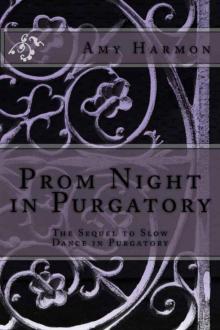 Prom Night in Purgatory
Prom Night in Purgatory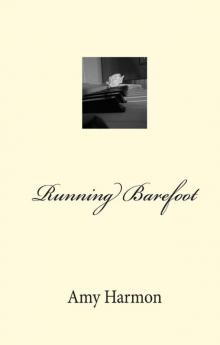 Running Barefoot
Running Barefoot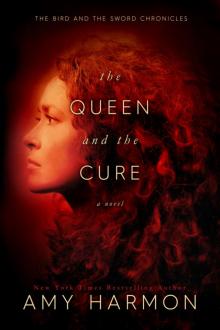 The Queen and the Cure
The Queen and the Cure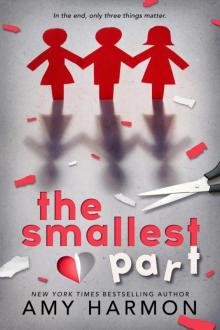 The Smallest Part
The Smallest Part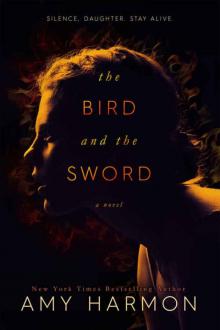 The Bird and the Sword
The Bird and the Sword The Song of David
The Song of David Infinity + One
Infinity + One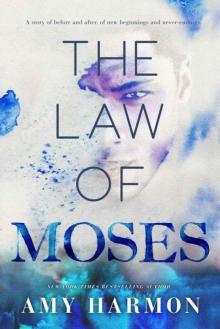 The Law of Moses
The Law of Moses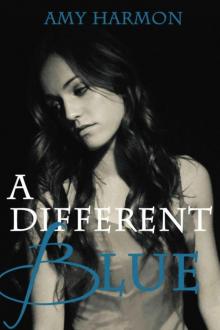 A Different Blue
A Different Blue From Sand and Ash
From Sand and Ash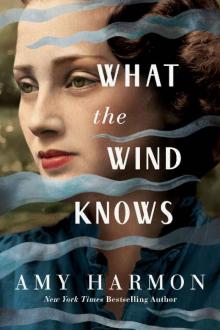 What the Wind Knows
What the Wind Knows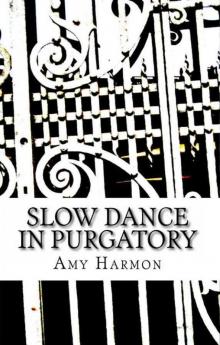 Slow Dance in Purgatory
Slow Dance in Purgatory Romance Through the Ages
Romance Through the Ages